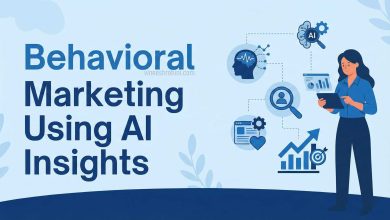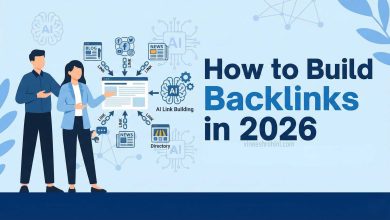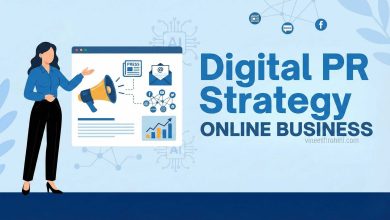How Digital Marketing is Powering Modern Business Success
In the fast-paced and technologically driven world of today, digital marketing has emerged as a pivotal force behind the success of modern businesses. Traditional methods of marketing have taken a back seat as digital strategies offer unparalleled reach, precision targeting, and real-time interaction with customers. This essay explores the multifaceted ways in which digital marketing has become the driving force behind business success, encompassing aspects such as customer engagement, data-driven insights, global reach, and cost-effectiveness.
1. Customer Engagement and Interaction
Digital marketing has revolutionized the way businesses engage with their customers. Through social media, email campaigns, interactive websites, and mobile applications, companies can create personalized and meaningful interactions with their target audience. Social media platforms like Facebook, Instagram, and Twitter enable businesses to directly communicate with customers, receive feedback, and build lasting relationships. Customer engagement is no longer a one-way street; it’s a dynamic and ongoing conversation.
Furthermore, the rise of content marketing allows companies to provide valuable information to their audience, positioning themselves as industry experts. This not only engages customers but also fosters trust and credibility, which are essential components of successful business relationships.
2. Data-Driven Insights and Analytics
One of the most significant advantages of digital marketing is the wealth of data it generates. Through website analytics, social media metrics, and email campaign statistics, businesses can gain deep insights into consumer behavior and preferences. This data-driven approach allows companies to make informed decisions, tailor their marketing strategies, and optimize their campaigns for better results.
For instance, A/B testing is a common practice in digital marketing where two versions of a campaign are compared to identify which one performs better. This data-driven experimentation empowers businesses to refine their tactics continuously, ensuring that their efforts yield the desired outcomes.
3. Global Reach and Targeting
The internet has transformed the world into a global village, and digital marketing leverages this interconnectedness to enable businesses to reach a worldwide audience. Through search engine optimization (SEO) and pay-per-click (PPC) advertising, companies can target potential customers based on their location, interests, demographics, and online behavior.
This unprecedented level of targeting ensures that marketing efforts are focused on those most likely to convert, reducing wastage of resources. Small businesses can now compete on a global scale without the need for a massive advertising budget, leveling the playing field and fostering healthy competition.
4. Cost-Effectiveness and ROI
Digital marketing provides a cost-effective alternative to traditional marketing methods. Traditional advertising avenues like television, radio, and print media often come with hefty price tags, limiting their accessibility to large corporations. In contrast, digital marketing offers various budget-friendly options, including social media ads, influencer partnerships, and email campaigns.
Additionally, the ability to track and measure the return on investment (ROI) accurately is a hallmark of digital marketing. Businesses can monitor the performance of their campaigns in real-time and adjust their strategies as needed to ensure optimal results. This not only saves money but also maximizes the impact of every marketing dollar spent.
5. Personalization and Customization
Digital marketing allows businesses to create highly personalized and customized experiences for their customers. By analyzing consumer data, companies can tailor their messages, product recommendations, and offers to individual preferences. This level of personalization not only enhances the customer experience but also increases the likelihood of conversion.
For example, e-commerce giants like Amazon utilize sophisticated algorithms to suggest products based on a customer’s browsing and purchase history. This personalized approach not only increases sales but also deepens customer loyalty.
6. Innovation and Creativity
The digital landscape encourages businesses to think outside the box and embrace innovation. Creative campaigns that go viral on social media platforms can generate immense brand awareness and engagement. Memorable and shareable content spreads rapidly, allowing even small businesses to make a big impact.
Platforms like YouTube, TikTok, and Instagram provide spaces for businesses to showcase their creativity through videos, short clips, and visually appealing posts. These platforms provide opportunities to captivate and resonate with audiences in new and exciting ways.
7. Adaptability and Flexibility
Digital marketing offers unparalleled adaptability and flexibility, allowing businesses to pivot their strategies quickly in response to changing market dynamics. Unlike traditional marketing campaigns that require significant lead time and resources, digital marketing efforts can be adjusted on the fly. This agility is particularly crucial in today’s rapidly evolving business landscape.
For instance, during the COVID-19 pandemic, many businesses shifted their focus and messaging to address the new reality. Restaurants embraced online ordering and delivery, fitness studios offered virtual classes, and brands conveyed messages of empathy and solidarity. These adaptations allowed businesses to stay relevant and connected to their audience despite challenging circumstances.
Conclusion
In conclusion, digital marketing has emerged as a cornerstone of modern business success. Its ability to engage customers, provide data-driven insights, reach a global audience, and do so cost-effectively has transformed the way businesses operate and grow. By harnessing the power of digital marketing, companies can not only survive but thrive in today’s competitive landscape. The future holds even more promise as technology continues to advance, opening new avenues for innovative and impactful marketing strategies.



